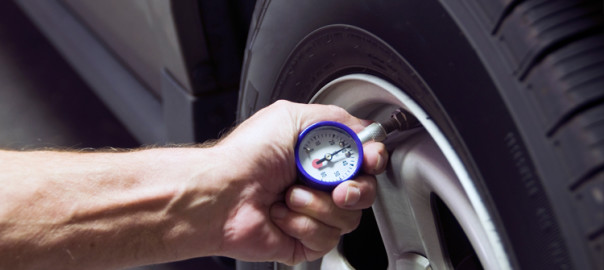The most common cause of a call to request roadside towing is the incidence of a flat or blown out tire. If this happens to you, the skilled technicians at Chicago Towing are more than prepared to provide roadside assistance to pull you out of this situation – but of course, prevention is absolutely the best method. If you want to be proactively prepared and prevent any sort of tire failure, you need to learn a bit about proper tire maintenance.
The first step towards sustainably healthy tires is maintaining a proper inflation pressure for all four. By doing this you not only optimize your car’s performance, but also increase its safety – not to mention your monetary savings on fuel. In order to make sure that your car’s tires have correct pressure, check them periodically, about once or twice a month. Make sure that the tires feel cool to the touch – so don’t check them right after you finish driving – and use a working pressure gauge. The inflation level of your tires is specifically very important to maintain before embarking on a long car trip when your vehicle suffers slightly more wear than it usually does on a day to day level, and when you’re far from your local repair shop or even far away from anyone who can help. As a stated rule – always check your tire’s inflation before leaving on a long trip.
Depending on the manufacturer and model of your vehicle, it has a specific ideal tire pressure level – this can usually be found inside the car’s placard or inside the car’s owner manual. The single most effective way to preserve the working order of your car, it’s tires, and their tread life is to maintain a regular ideal tire pressure. Underinflation is the largest cause of tire failure – which can crack your tires, separate internal mechanisms, or even blow out the entire wheel. You don’t want that to happen when you’re on the road; no less in the middle of nowhere.
Secondly, make sure not to spin your tires in excess. The usual instinct that drivers follow when their vehicle is stranded in mud, sand, snow, or ice is to spin the tires and try to get out. This can be very harmful to your car because the centrifugal forces generated by the spinning tire could cause a sudden tire explosion – if you’re trying to get out of a pile of dirt or sand that you’re stuck in make sure not to drive above 35 mph, and use a slight back and forward rocking movement to gently free your car from its predicament.
On a regular basis check to see if your tires are worn out. Your tires should be taken out when they are worn down to 2/32’’ of tread depth left. All currently manufactured tires have indicator lines to show how far the treads are worn into – smooth lines inside the tread groove. Driving on tires with worn out treads is dangerous as the majority of rain or snow based accidents happen when a car starts skidding on worn out – or “bald” – tires. Not to mention the ease with which worn out tires can be punctured and blown out by any glass or roadside debris.
Since tires have broad contact with possible road debris, it’s essential that you check them on a monthly basis – at least – to preserve your safety. Any sorts of air loss, cracks, bulges, holes, or knots should warrant the removal of the tire and a close inspection by a professional. If you can, don’t overexert your car. The vehicle owner’s manual should have a set limit to pressure and exertion which should never be raised – as that can cause lots of problems, including affecting how your vehicle drives and how fast it eats up fuel – not to mention raising the possibility of tire failure. In some situations, exceeding your vehicle’s limits can cause serious cracking or a blowout.
In order to prevent abrasive vibration or excess tire wear, have your tires rotated on a regular basis – make sure they are properly inflated, aligned, and balanced – and replace any broken or worn out suspension mechanisms. Misalignment can cause scrubbing against the surface of the road which abrades the tire and unbalanced them – causing extreme vibration that can not only exhaust the human driver of the car, but can seriously take a toll on the suspension of the vehicle.
If you are able to change a tire, make sure that you have a spare one in your car at all times. That can save you a great deal of money and stress in situations where you get stranded. In fact, keep a tire on you even if you don’t know how to change it – so you can save some money once you contact a roadside assistance provider. We hope that the above tips will help you preserve the longevity of your vehicle’s tires – if you find yourself in a dire situation, Chicago Towing is always available to help you. Simply call us with any questions and we can be at your direct location in minutes.

